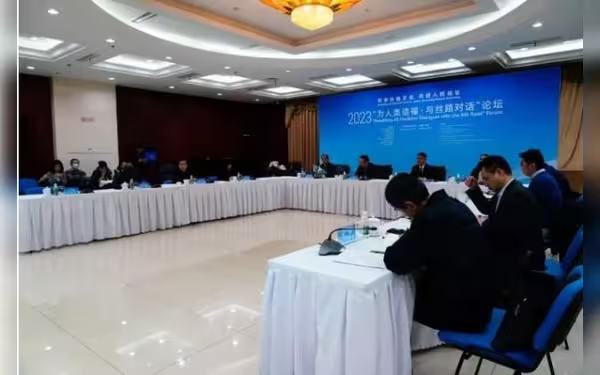Thursday, November 7, 2024 05:55 AM
South-South Cooperation Forum Advances Green Silk Road Initiatives
- Global leaders discuss climate cooperation at South-South Forum.
- China leads green development efforts with 42 countries.
- Brazil plans to restore 40 million hectares of land.
 Image Credits: urdupoint
Image Credits: urdupointThe South-South Cooperation Forum in Beijing emphasizes collaboration for a green Silk Road and sustainable development among developing nations.
In recent years, the world has faced numerous challenges, particularly in the realms of climate change and sustainable development. For developing countries, the concept of South-South cooperation has emerged as a vital strategy to tackle these pressing issues. This cooperation involves countries in the Global South working together to share resources, knowledge, and technology to address common challenges. The recent South-South Cooperation Forum held in Beijing highlighted the importance of this collaboration in building a green Silk Road, which aims to promote environmentally friendly practices and sustainable development.
During the 2024 Annual General Meeting of the China Council for International Cooperation on Environment and Development, global leaders and experts gathered to discuss how developing nations can strengthen their cooperation in environmental and climate-related fields. The discussions focused on innovative models and pathways for global ecological collaboration, emphasizing that climate change is a challenge that affects all of humanity. Many developing countries are currently grappling with the dual pressures of economic development and climate change, leading to significant demands for infrastructure and production development.
The United Nations Environment Program's Adaptation Gap Report 2023 revealed a staggering funding gap for developing countries, estimating that they require between USD 194 billion and USD 366 billion annually to adapt to climate change. This highlights the urgent need for international support and collaboration. As the world shifts towards green and low-carbon development, countries like Brazil are taking proactive steps. Carlos Ernesto Augustin, a special adviser to Brazil's Minister of Agriculture and Livestock, announced plans to restore 40 million hectares of degraded land to enhance agricultural productivity. Brazil is actively seeking international cooperation to ensure the success of this ambitious initiative.
China has been at the forefront of establishing green and low-carbon development cooperation mechanisms with countries involved in the Belt and Road Initiative. To date, China has signed 53 memorandums of understanding on South-South cooperation regarding climate change with 42 developing countries. Additionally, over 3,000 personnel from more than 120 countries have received training in ecological and environmental management through Chinese initiatives. Projects like the African Light Belt and the development of low-carbon demonstration zones are practical examples of how China is assisting developing nations in enhancing their climate resilience.
Prominent economist Jeffrey Sachs emphasized the need for accelerated energy transformation to achieve a zero-carbon future. He noted that China's robust production capabilities can provide essential green, clean, and digital infrastructure to the world. The Belt and Road Initiative serves as a crucial mechanism for promoting these transformative projects and expediting the global transition towards sustainability.
The conference also released a special policy research report titled "Green Opening-up and South-South Cooperation," which included several policy recommendations. These recommendations aim to strengthen the China-ASEAN regional strategic partnership in clean energy development, explore sustainable trade opportunities between China and Africa, and enhance green cooperation between China and Brazil through high-level dialogues.
The South-South Cooperation Forum serves as a reminder of the collective responsibility that nations share in addressing climate change and promoting sustainable development. By fostering collaboration among developing countries, we can create a more resilient and sustainable future for all. The path to a green Silk Road is not just about infrastructure; it is about building partnerships that empower nations to thrive in harmony with the environment. As we move forward, it is essential for countries to continue working together, sharing knowledge, and supporting one another in the face of global challenges.













